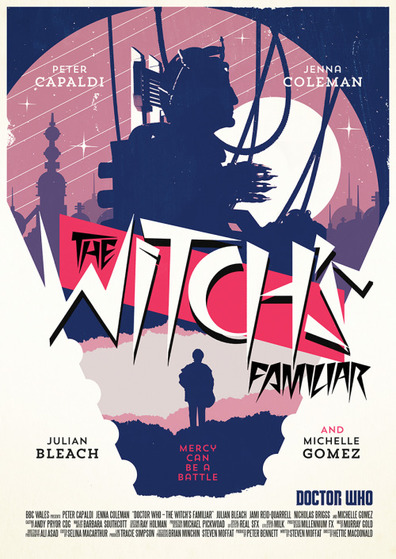 by James Wylder Today on Doctor Who, we dredge up the detritus. This is a story constructed out of old parts. There in the background-- is that the special weapons Dalek? The weirdly shaped one? It even gets a line this time. We mold this story together out of old parts and forgotten memories, and then tip the rubbish bin over on its side and burst forth anew from it. The nostalgia is the aesthetic, the old stories are what we remember, but its the new stories we keep creating that push us forward. The episode is in every way a reflection, its title is a mirror of its predecessor, “The Magician's Apprentice,” the aesthetics mirror old Dalek stories from Hartnel to Cushing to Tennant, and the character interaction is a mirror of “The Genesis of the Daleks”, while the set up itself is a mirror of the previous series finale “Dark Water/Death in Heaven” where Missy takes up an old monster of the Doctor's and has a story with them. But again, its reversed. Where before Missy was controlling the Cybermen, here she is fighting alongside the Doctor in a weird perverted way, teaming up with Clara to try to save him. Again, these scenes of Missy and Clara are mirrored with Davros and the Doctor. The reflections aren't what we expected of them, though. In getting to see how Missy handles a mission, we see up close and personal her excitable cruelty. She somehow works in a similar way to the Doctor, and yet not at all. You can tell that they grew up together, that their methods of problem resolution are tied together in a mutal understanding, and yet they are also incompatible. With how cruelly Missy treats Clara, one has to look back at Series 3 of Doctor who and shudder at what exactly Lucy Saxon had to go through. It must have been worse that we imagined it. Strangely, we get to see the Doctor paired with Davros in a totally congenial way. The two of them get along for the most part, aside from the Doctor stealing Davros' chair, the Doctor shows real compassion for Davros on his deathbed (death... chair?). In what might be one of the most brilliant pieces of dialogue I've seen recently, Davros is informed of Gallifrey's survival, and is genuinely happy for the Doctor. At first, its confusing, but then Davros explains himself, and the scene manages to make Davros both more understandable, while also revealing him truly as the nationalist fascist he is as he gives a speech about how every man should have his own place he hails from. The speech is heartfelt, even though the scene itself is a ruse, and shows us more about the difference between Davros and the Doctor than we had before. Its not just that the Doctor wants Galifrey back, its that the Doctor wants it back because all the people there died, just just cause it was its home. Davros' tears somehow reduce Galifrey to simply being another pinprick on a map, a cultural joyland that should remain isolated, when the Doctor himself thrives on leaving, on exploring, on changing and understanding. Thus, is Skarro rebuilt as a relic. The Daleks remade a city in the shape of their heritage, and let an old man drain their life away for the sake of the past. They are so hidebound to their own creation, their own story, that they cannot progress. When they finally do progress, taking the Doctor's regeneration energy, it destroys them. The very process of change is anathema to the fascism of the Daleks. They cannot truly progress to the next level without sacrificing their isolated purity. The Doctor meanwhile is able to survive by ignoring his own history. When all the Daleks expect him to have a sonic screwdriver, he has changed yet again, and has sonic shades. He is always adapting, always learning, and always, in the end, merciful. The Doctor's great victory in the end, is corrupting the Daleks. By going back in time to save Davros, he drops a hint of color into their sea of white washed conformity. The Daleks can ask for mercy now, they know what it is, and they will be forever cursed by this taint of goodness. They will not be good, but their iron charge has that hint of hesitation, that tiny urge for decency. A defect that could not be put out. Always, mercy. From all that defeat, from all that hell, from all that cultural detritus, something new is rising out of something old. Something holy from the sewers. Lets note the funny bits, now, shall we? -”The last chair on Skarro!” made me laugh harder than any joke on the show I can remember. A+ (also, a nice call back to the parody of Doctor Who Moffat wrote “The Curse of Fatal Death.”) -”Your Sewers are Revolting!” -”You are a bad doctor...” -Missy poking Davros in the eye after she said she'd scratch his eyes out last episode. Nice. -Oh, and if you rewatch “The Big Bang” from series 5, there is a scene with a Dalek that has some new meaning!.
0 Comments
Leave a Reply. |
James Wylder
Poet, Playwright, Game Designer, Writer, Freelancer for hire. Archives
October 2023
Categories
All
|
 RSS Feed
RSS Feed